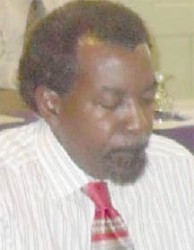With post-harvest losses accounting for an estimated 40 per cent of the region’s agricultural produce, the Caribbean Community (Caricom) is collaborating with the Food and Agriculture Organisation (FAO) to roll out a plan that will see experts working with the region’s farmers to ensure that greater volumes of farming produce get to markets.
Caricom Secretariat Food and Nutrition Security Focal Point Policy Consultant Johan David told Stabroek Business in an interview last week that the initiative was designed to reduce wastage and increase the earnings of the region’s farmers. It is likely to be rolled out “in a few weeks’ time” under the auspices of the Regional Food and Nutrition Security Policy and Action Plan, he added.
Caricom Agriculture Trade Specialist in the Office of Trade Negotiations Nigel Durant told Stabroek Business that the region’s high level of post-harvest losses had to do with a number of factors including the unavailability of markets. “In some instances, crops may not have been reaped when they should have been reaped because of a lack of packaging and storage facilities. There are also other problems along the marketing chain,” Durant added.

Regional watchers have commented on the slow pace of promised Caricom food security pursuits. However, David said the Regional Food and Nutrition Security Policy and Action Plan were “not just pieces of paper but working documents set up in such a way that there are specific objectives that must be achieved over a very short period as well as those that are longer term for varying reasons.” She said the issue of post-harvest losses was one which the region was seeking to address in the shortest possible time in response to concerns expressed by regional farmers. David told Stabroek Business that the issues of markets and linking farmers to them are also being addressed through regional initiatives. “We have organisations like the Caribbean Farmers Network (CAFAN) that has taken this on as their role. They are engaged in ensuring not only that production is taking place but that farmers have opportunities to access regional and international markets.”
Durant said Caribbean Week of Agriculture (CWA), which opens today in Georgetown, is expected to bring together the region’s policy-makers and other stakeholders through the various agricultural support organisations to assess the unfolding food security-related initiatives and to chart the direction for the future.
“What the CWA does is, among other things, to provide opportunity for networking among the various players in the agricultural sector in the region. Several workshops will be held. Farmers from various parts of the region will meet and there will be opportunity to review several projects,” Durant said.
He said one of the more interesting projects currently on stream had to do with the role of information and communication technology in the agricultural sector. Durant said CWA also provided “a platform for exchanging information and planning initiatives for the region.”
Billed as the premier agricultural event on the region’s calendar, this year’s CWA which is being held under the theme, ‘Linking the Caribbean for Regional Food and Nutrition Security and Rural Development’. Conceptualised by the Inter-American Institute for Cooperation on Agriculture (IICA) as a mechanism for placing agriculture and rural life on the front burner of regional integration activities, CWA is also designed to enable the key decision-makers in the regional public and private sectors to better acknowledge the importance of farming and rural life to the economic, social and environmental stability of the region.




